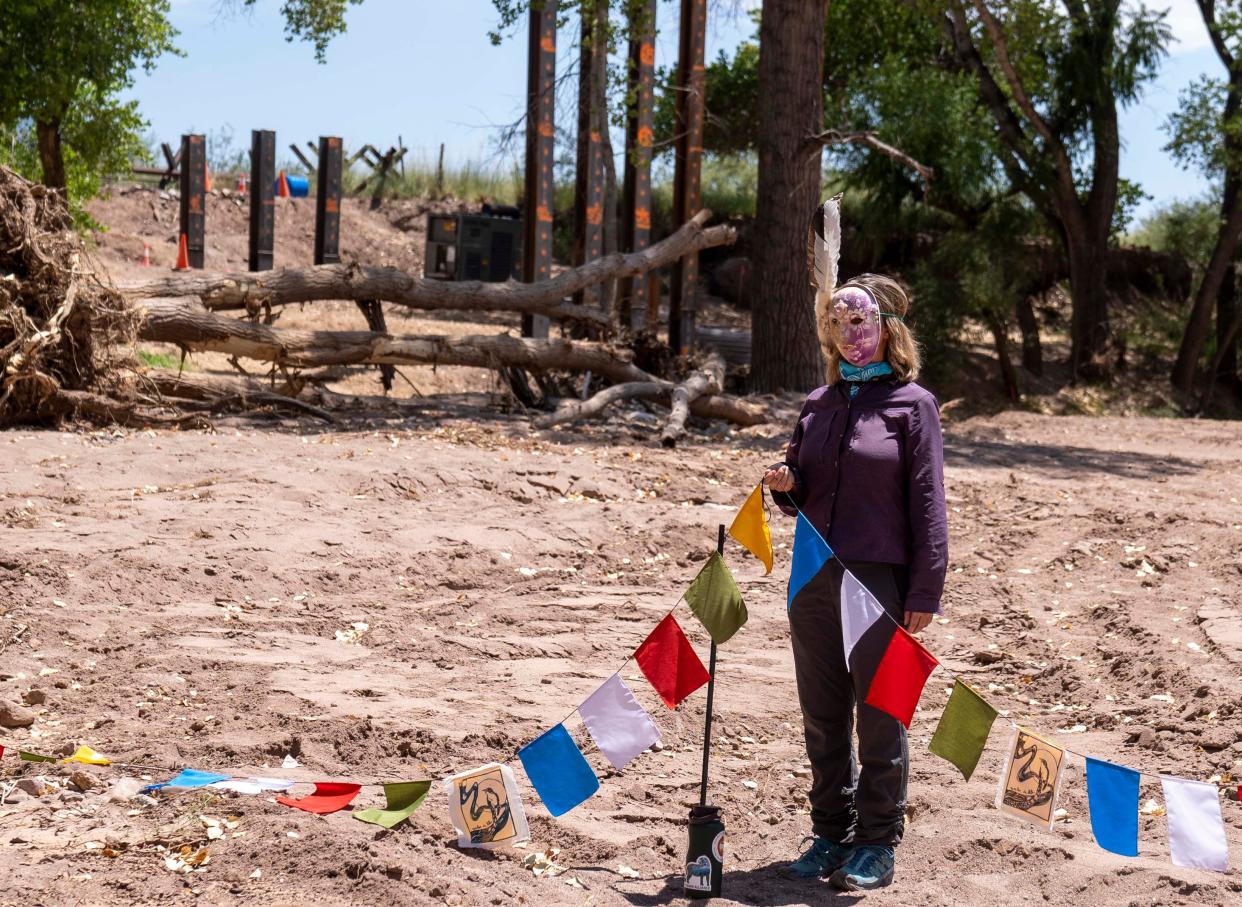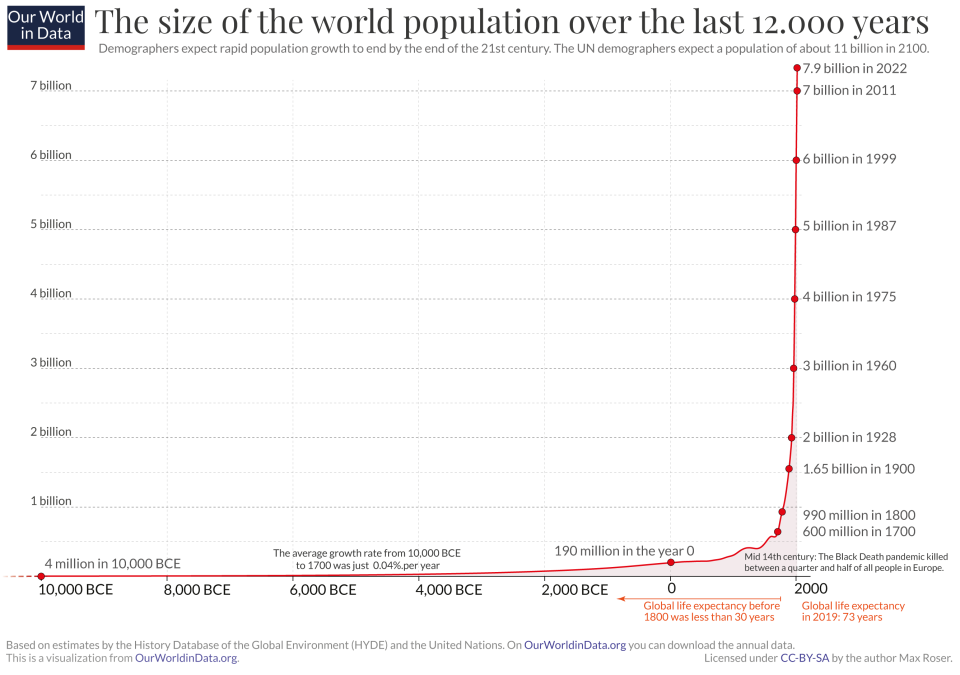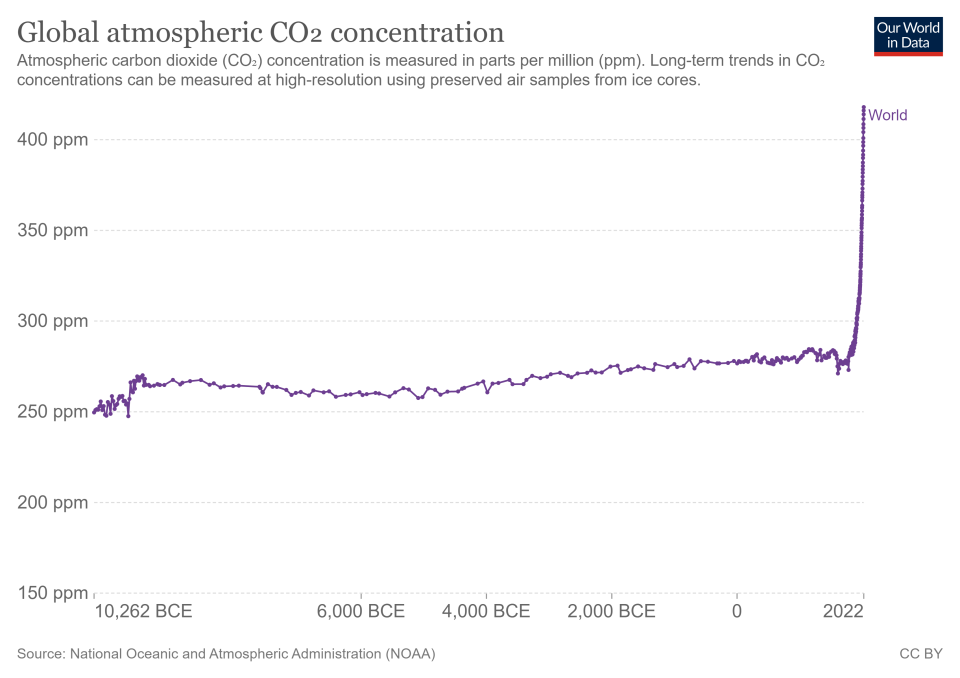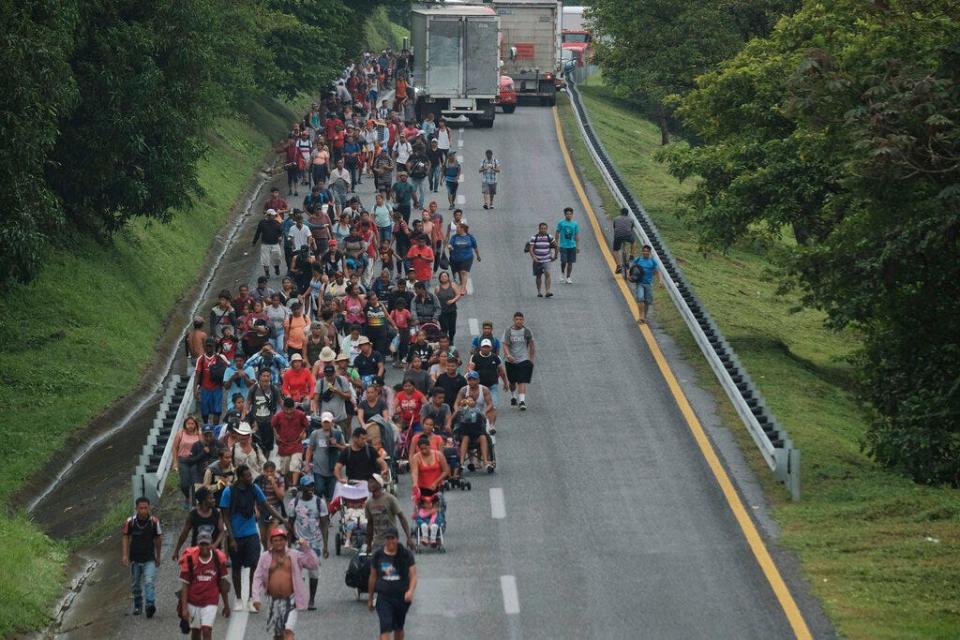Welcome to a new year on a warming planet, now with 8 billion people

We start 2023 sharing the planet with 8 billion other people.
The United Nations' global population counter clicked passed this estimated milestone in mid-November. In the context of climate change, what that means is that roughly 8 billion humans now aspire to own a smart phone, a tablet, a television, an automobile, a house connected to power and more. Approximately 27,000 first-time internet users come online every hour, according to a 2016 analysis by Our World in Data. And the number of global airline flights, a major contributor to the release of heat-trapping greenhouse gases into the atmosphere, is on track to surpass pre-pandemic levels this year.
Meanwhile, manufacturing of screens and the transition to renewable energy sources is limited by processes in minerals mining, the grid is not yet outfitted to fully support electric utilities or transportation and concern about fossil fuel reliance grows each day. With this backdrop, the idea of more and more people seeking to increase their quality of life, as we all do, by tapping into a fixed set of global resources may feel overwhelming.

This topic seems to have already been on your minds. Looking over emails from readers regarding our weekly climate series, a theme emerged: Despite 2022's political, technological and social progress to address warming trends and the challenges in those areas that remain, what many of you are thinking most about is overpopulation.
This concern is so common that, halfway through writing this story, I noticed that environmental writer Jonathan Thompson recently wrote a similar response to his readers in High Country News highlighting key stats on how the crisis is largely created by rich people specifically. Overpopulation also got airtime on the first "60 Minutes" broadcast of 2023, with famed Stanford biologist Paul Ehrlich, who was one of the first to raise the alarm about climate change and is also credited with "inciting a worldwide fear of population," talking about how an unsustainable number of humans is driving the ongoing extinction crisis (a major problem since we can't survive on a planet of only humans).
One Republic reader was so distressed that he took the time to print and mail graphs to our newsroom meant to illuminate the similarities between curves charting both the rising concentration of greenhouse gases in the atmosphere and the global population over time. Both show the classic "hockey stick" shape that tracks slow, steady, mostly-horizontal increases across early human history (the straight, longer part of the hockey stick the player holds), followed by rapid, exponential, nearly-vertical increases in recent decades (the sharp bend leading to the part of the hockey stick that delivers the devastating puck acceleration).

But while the two curves are undeniably similar, the problem is arguably more of a chicken-or-the-egg scenario. Did greenhouse gas emissions rise to dangerous levels strictly because we allowed global population to get out of control, in some kind of equation where more people inexorably equals more energy? Or, amid population growth typical of a flourishing species, have we increasingly indulged in excessively energy-rich ways of life?
As far as the exact human causes of the ways we're seeing nature respond to warming temperatures and how best to respond to ensure our own survival, in this case, there are some other ideas.
Manfred Laubichler is a professor of Theoretical Biology and the History of Biology as well as the director of the School of Complex Adaptive Systems and the Global Biosocial Complexity Initiative at Arizona State University. Those titles are a mouthful, but his work boils down to thinking about the what the evolutionary history of both nature and knowledge might teach us about possible life hacks moving forward. In even simpler terms, he studies our biological past for tips on how to live our best future.
The Arizona Republic reached him in Berlin, where he spent time between semesters working with collaborators at the Max Planck Institute for the History of Science, to discuss his views on how population is not the problem and might even be a solution to the climate crisis, with more brains giving rise to more ideas on how to adapt. The conversation, including some controversial concepts he explained in more depth than we could include, has been necessarily edited for length and clarity.
Animated bar chart showing the evolution of the most populous countries from 1800 to 2100.
Future projections are based on the UN World Population Prospects Median Scenario. Historical populations are reported relative to present-day national boundaries. pic.twitter.com/olsztghJlE— Dr. Robert Rohde (@RARohde) August 12, 2019
I’ve been getting emails from people telling me that whatever I'm writing regarding climate change doesn't matter because the real problem is overpopulation. And while I recognize that overpopulation is certainly a parameter here, it's not something that can just be fixed in any kind of ethical way. So, I thought it might be interesting for my readers to hear from you about what else overpopulation might mean for us as a global society coping with a dangerously warming climate.
M.L.: As you said, yes, population is a major contributing factor (to climate change). It is not one that can be solved overnight. And the absolute numbers are actually only a very small part of the story. What we did in our work is to try to take that deep history approach and say, “When did this dynamic that we are currently experiencing really start?”
You have to go back several thousand years, to the early Neolithic. We had enough people that had enough experience about their environment that they extracted the knowledge necessary to start agriculture. Once that happened, then we see what we call the "Anthropocene engine" beginning to run. And that is basically a positive feedback loop between population size, knowledge generation and energy use. So it’s when enough people produce more and more knowledge that allows them to extract more energy which supports more people, and you see how this is going and going and going.
This is more or less an inevitable process if our species behaves like any other biological species, using whatever it’s got to increase its numbers. For a long time, we were limited in our growth potential because we experienced regulatory feedback from the environment. But our species is unique because we extracted knowledge that allowed us to basically emancipate ourselves from a lot of those regulatory controls as part of what you can call the process of civilization. And now we have created a mess.
Human limits of modern agriculture:Climate change could push produce prices higher, slowing the fight for food justice
At the same time, we have enough knowledge that we actually know what to do. What we have not figured out is how to implement that knowledge as a society because, in many ways, what we have to do is create regulatory structures as a civilization, meaning rules for a different type of economic system or application of technologies that are more circular and non-extractive.
So that's where the target is. And at ASU, that is exactly the focus of the Global Futures Laboratory: to understand and then implement solutions for “how do we actually shape the world of societies to do something differently?”
What would that look like, to evolve as an intelligent civilization to live smarter instead of just bigger?
Ten thousand years ago, every human on this planet had an average daily energy use of about 90 watts. Today, everyone uses about 11,000 watts. That's a more than 104-fold increase. So we are no longer just a biological species. We are this socio-technological species. The biological part of what we need to survive is a very small part of our daily energy use.
Even if we would reduce our numbers, our infrastructure won't go away. A lot of our energy use actually goes to maintaining and expanding our technological infrastructure in a way that makes the relationship between population size and environmental footprint more complicated. So controlling populations right now doesn't really help us. Because what you're saying is you want to go back and use less energy, which nobody wants to do.
We need to redesign and transform our infrastructure to make it less of a burden on the environment. Right now we have a linear extractive mode of production: We mine something, then we turn it into some products and then we throw them away. If you would close those material flows, we would eliminate a lot of the negative footprint on the environment. It's a question of applying a different set of behaviors.
Climate seriesThe latest from Joan Meiners at azcentral, a column on climate change that publishes weekly
For sure. If we could recycle more, use less, be more efficient, that would be great. But those redesigns cost money. And, under capitalism, people tend to think that we should let economics dictate our decisions. So I know you're not a behavioral scientist, but how do we bridge that gap?
The solution is not about challenging the existence of markets and competition. It is about having real markets and real competition, because our current system operates under the assumption that the profits get privatized and the costs get basically externalized to the society at large.
If companies can produce whatever they want but are responsible for the lifecycle of their products, that's a simple regulation that would change the economics and make modes of production that incorporate a circular system much more competitive. And I would say many people actually are very willing to support that, if they would be given the option. But that only gets us so far, because they do not really have fair alternatives to purchase products that (align with these) values because those are currently not competitive in this marketplace that does not reflect the true (environmental) costs of products.
COP27 Global Climate Conference:Who should pay for climate change? Finance a focus of climate talks at home and abroad
The global fossil fuel industry is corrupt and subsidized, to a degree that is more costly than what it would take to transition to renewable energy sources. But this is not something that individual consumers or citizens can easily influence. What we really would need to have is some global regulation that allows everybody to benefit from what those companies have to offer without being exploited and subjugated to whatever else they're doing.
This is something that I see can happen. But (with the slow pace of progress at COP meetings, for example) I don't know on what timescale it can happen, or what it would take for those necessary transformations to actually materialize. And the problem is time is what we don't have. We are running out of time.
Ok so if capitalism can work within environmental bounds as long as companies are responsible for the lifecycle of their products, do we do that on the front end by pricing items according to their true environmental cost and improving how we factor cleanup expenses into permitting? Or is the idea to expand company operations where if Apple wants to make new iPhones that only last two years, for example, then they need to be responsible for retrieving all the old iPhones and recycling those materials back into circulation?
Well, I think what we need is both. There's a saying in evolutionary biology that you cannot put up a sign "Closed for reconstruction." Every step in an evolutionary transformation has to work and I think the same applies to our economy. We can't shut everything down and start from scratch because we need to continue to function on a day-to-day basis. So we have to find strategies of transition that actually work.
The question is, what are the right kind of incentives? If you try to prescribe all of that upfront, that might not work. But if the framework is that companies (gradually) adapt to whatever the rules are, then the ones that are successful will be the ones that survive. Others that can't adapt will go out of business. That will be the transition phase. But we need fair playing fields for the market to work, and values that impose almost a Hippocratic oath in business: Your products are not allowed to do harm and if you sell a product that ruins the environment, you get sued.

I think you'd get a lot of people who would say that anything made from plastic, for example, is harmful, which could create a different kind of harm if it limits production of things like medical devices. How do we navigate those kinds of considerations?
That's a good point but, as I said, we don't lack knowledge. Certain types of plastics are clearly necessary. In other areas, plastic is just convenient, for packaging and things. We do know that there are alternatives which are currently not cost effective, including some new innovations where you have versions of plastic that are biodegradable.
If you imposed regulations that say that anything that ends up in a landfill or pollutes the environment must fulfill certain beneficial functions and the impacts are priced into your product, but you have to use materials that are biodegradable for everything else, you can close that cycle. So we don't have to over-regulate, we just need the right kind of smart regulations, because for many of the downstream consequences, I think market mechanisms are quite effective. They have been effective in building up our current society and our current range of products. And they can be effective if we change the regulatory parameters.
It'll be an interesting year of complex considerations ahead. To end our conversation back on the idea of overpopulation, is there a number you think really is unsustainable, if 8 billion isn't it?
We know that we are currently in what's called the Great Acceleration of the Anthropocene, where everything is growing exponentially, and that is clearly not sustainable. The models of population growth are such that we will plateau at between 9 and 10 billion people globally over the next few decades.
The question is the following: how can we influence the shape of this curve? We know exactly what we have to do to bend that population curve down faster. And that is very simple: Educate women globally, to slow reproduction.
Joan Meiners is the Climate News and Storytelling Reporter at The Arizona Republic and azcentral. Before becoming a journalist, she completed a doctorate in Ecology. Follow Joan on Twitter at @beecycles or email her at joan.meiners@arizonarepublic.com.
Support climate coverage and local journalism by subscribing to azcentral.com at this link.
This article originally appeared on Arizona Republic: With 8 billion people, is overpopulation fueling climate change?

